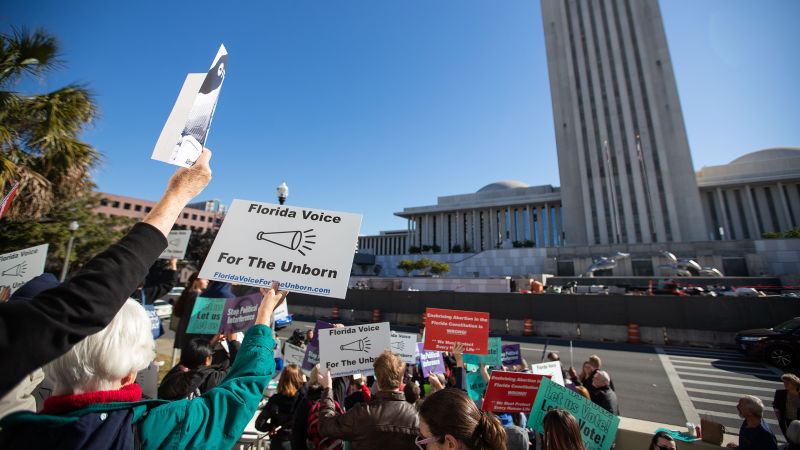The Florida Supreme Court recently made a ruling that upheld the state’s current 15-week abortion ban, which will trigger a six-week abortion ban approved by Florida lawmakers. However, the court also approved the wording of a proposed state constitutional amendment that would protect the right to an abortion in Florida, known as Amendment 4, which will go on the ballot this November. Constitutional amendments in Florida require the support of at least 60% of voters to be approved. These rulings will make Florida one of the most restrictive states in the country to obtain an abortion and set up a fight over reproductive rights in the upcoming presidential election.
The proposed amendment will join other states like Michigan and Ohio where voters have directly weighed in on reproductive rights since the US Supreme Court overturned Roe v. Wade. The initiative could impact voter turnout in the close race expected between President Joe Biden and former President Donald Trump. The campaign director for Yes on 4, Lauren Brenzel, expressed excitement about the opportunity for Floridians to vote in support of the amendment and protect their bodily autonomy. The court’s decision has underscored the significance of Florida’s ballot initiative process, giving voters a chance to take control when they feel politicians are not representing their interests.
Florida’s Governor, Ron DeSantis, signed a law last year banning most abortions after six weeks, with exceptions for victims of rape, incest, and human trafficking up to 15 weeks into a pregnancy. The law also restricts telehealth abortions and requires medication for abortion to be dispensed by a physician. Planned Parenthood and other groups filed a lawsuit to challenge the law, and it was stalled while legal issues were resolved. Florida has a history of court decisions blocking attempts to restrict abortion, but the recent Supreme Court ruling marked a significant shift in abortion access in the state.
The court’s decision to retreat from long-standing protections linking the privacy provision in the state constitution to a woman’s right to an abortion will have a major impact on abortion access in the southeastern United States. Virginia will become the closest state for women in Florida to seek abortion access after six weeks, as many southern states have stringent abortion bans. Advocates like the president of Planned Parenthood of South, East, and North Florida, Alexandra Mandado, have criticized the ruling as a setback for human rights, particularly for vulnerable communities facing barriers to care. The court also approved ballot language for Amendment 3, which will allow voters to decide on legalizing recreational marijuana in November.
The Biden campaign believes that they are in a stronger position to win Florida in the upcoming election, citing mobilization efforts around abortion rights and contrasting Biden’s record with that of Trump. Biden’s campaign manager, Julie Chavez Rodriguez, highlighted the financial advantage and vulnerabilities within Trump’s coalition as factors that could help flip the state blue. The issue of abortion rights has proven to be a mobilizing factor for voters, as seen in past elections. The recent ruling by the Florida Supreme Court on the proposed amendment further emphasizes the importance of reproductive rights in shaping electoral outcomes.


